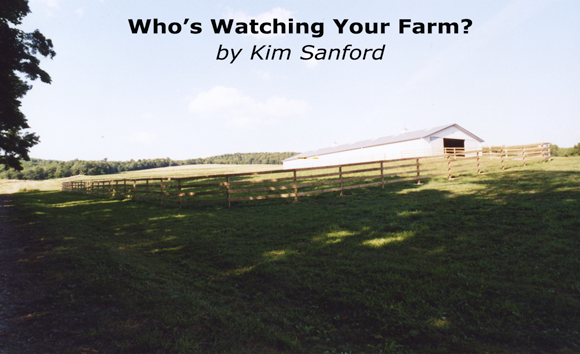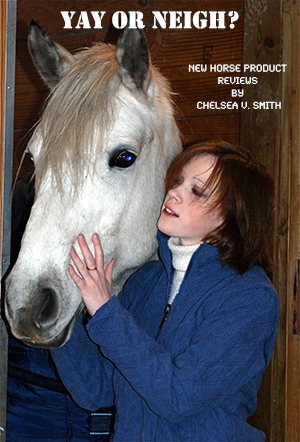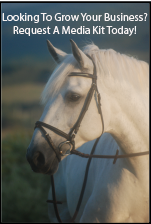Who’s Watching Your Farm?
by Kim Sanford

Leaving your place from time-to-time is a necessity and in many cases unavoidable. Even something as enjoyable as a vacation can create stress as you prepare for the trip and all that entails. What is the itinerary? What will I need to bring with me? Where am I staying? It’s a myriad of items you need to tick off the “To Do” list that need to be done before you go away. One of the most important things to consider is how to cover the things requiring attention while you are away…the mail, the kids/pets if they are not traveling with you. Pretty involved right? How about if you have a farm or livestock? The logistics of having that type of operation taken care of in your absence multiply exponentially.
Finding reliable, experienced people to watch over your horses and the other barnyard animals not to mention the household pets in your absence can be challenging and this is why good farm sitters are in huge demand. The smartest thing you can do is to find one or two people you can rely on to stop in and keep an eye on things while you are gone as quickly as possible…even if you do not anticipate going away any time soon. That way you and the sitter(s) can become familiar with each other and the routine well in advance of any absence. I cannot emphasize enough how important that is. Attention to details, no matter how small or inconsequential can sometimes be the difference between life and death should something happen while you are away.
Since this is an equine-related publication, my suggestions will have an emphasis on farm sitting for horse owners with the possibility of other species included. As we all know, in spite of their size and strength horses really are very delicate creatures in actuality. In some cases even a small variance in their regular routine can affect them profoundly.
It is vital that the person put “in charge” have experience and knowledge when it comes to handling horses. It is important to know the degree of your potential sitter’s experience with them. Do they have horses and if so how long have they had them? What type of health/injury issues have they dealt with? They also need to be mature and able to keep calm in an emergency, to do what must be done without panicking. Every horseman knows that Murphy’s Law…anything that CAN go wrong WILL go wrong…applies to horses ten-fold. We’ve all experienced it at least once, am I right, if horses have been in our lives for any length of time.
Some very important questions to ask while screening potential candidates are:
Can they safely handle feeding and watering chores, turnout, grooming if required, hoof-picking, medicating?
Can they halter and lead a horse safely in and out of the barn or bring a horse in from the pasture?
Can they deal with any minor emergency repairs, or handle any crisis that might occur?
In my opinion these are some of the most important questions:
Could they recognize and cope with an injured or ill horse?
Do they recognize the signs of a potential colic, or laminitic event…even the subtle ones?
Will they notice a slight lameness?
Do they know how to safely assist a cast horse and are they capable of doing so?
Once you have narrowed your choices down to one or two potential sitters it would be great if you could have them come to your farm and just follow you around helping to do some of the tasks they will be responsible for while you are away. Jobs like feeding, haltering, leading, medicating, etc. Watching them while they are handling your horses and having them do the things they may be doing while you are gone, will be a great barometer for evaluating their abilities. They should feel comfortable, be confident, and above all be competent.
Caveat: Both farm sitter and owner need to be aware of the dangers of COMPLACENCY.
I cannot stress this enough!! It is dangerous and so easy to fall into without even knowing you are there. In case anyone doesn’t know what it is…it is defined as a feeling of quiet pleasure or security, often while unaware of some potential danger, defect, or the like; self-satisfaction or smug satisfaction with an existing situation, condition, etc…that pretty well sums it up I think, especially the part about “self-satisfaction or smug satisfaction with an existing situation, condition”. We all go into “auto-pilot” numerous times a day and sometimes don’t slow down enough to look up and around. Routine, while it can be our friend can also be the enemy. Experienced, been there done that people, are often the worst offenders. I readily admit that I myself have fallen into it too many times; usually it works out alright, but it has been known to “bite” me from time-to-time…I cannot stress this enough although it usually is a minor “nip” the potential for worse consequences is there.
So…as a sitter or farm owner NEVER assume anything.
Owner: make sure you are detailed about everything even if it seems like a given. The sitter needs to know as much as possible and they should ALWAYS come to the farm to walk through the routine and property no matter how often they have done it in the past, but especially if the job is sporadic.
Sitter: ask, ask, ASK questions; no matter how “simple” they are. I truly believe that the only “stupid” question is the one that is not asked but should have been. Review the instructions and repeat it back to the owner so there are no misunderstandings. Know where all the important equipment is, even down to where all light switches or water shut offs are. I cannot stress this enough.
Neither party should EVER assume anything and all instructions need to be written down in detail…including payment requirements and or agreements.
Sitter and owner have to understand each other’s schedules and how they will gel. Again, I speak from experience and it cannot be emphasized enough…ask about the sitter’s daily schedule and how it will fit into your horses’ needs. Will they be able to spend the amount of time at your barn that you need? Too often our lives are so busy that we cram as much as possible into a day. That can make it difficult to be able to be at the farm as often or when the owner would prefer. Both parties need to be very clear on expectations and the candidate’s ability to make it happen. It is important to take into consideration what the animal is used to. All animals thrive on routine--the times they are fed, how they're fed, going in and out, etc. While they can cope very well with some variation, it is best to try to duplicate their routine as closely to normal as possible while filling in for the regular caretaker. No matter the situation, the caretaker has to be able to check on the horses/animals in their care at the bare minimum of every eight hours. Generally speaking, most problems/situations can be resolved within that time frame. Longer than that increases the risk of not having a “window” in which to successfully treat an injury or medical issue.
Another thing to consider is whether or not the sitter is willing to do the chores the way you need them done or are they more interested in doing things the way it suits them. There is nothing wrong with “new eyes” perhaps seeing something that might make the work flow better in their opinion but the bottom-line is how YOU need things done. If you make that clear and they seem dismissive or unwilling to handle things as you request then it is a good idea to rethink them as your sitter. Nothing is more annoying than someone who constantly suggests “better” ways of managing your routine especially when it is clear you know what you want and it works for you. Again, I am not saying they may not have good suggestions, but if you feel a lack of respect for you and your routine then moving on is the best choice.
Once you have decided on someone to entrust your farm and animals with their care it is important to ask for and check references. Above all you need a trustworthy individual. Keeping in the forefront of your mind that you are basically handing them the keys to your home/farm and precious animals. Many times our sitters are people we already know and this is not necessary or even possible. A neighbor, friend, or relative who looks after your horse might not do enough horse sitting to have references. The advantage of these people is that you have a good feel for their capabilities as well as more leeway in making sure they know what to do and what the expectations are. If however, you do not know your candidate, take the time to follow-up…preferably with others who have used them in the past. Professional sitters or those who horse sit regularly should be able to provide good references—current and/or former clients, their vet, farrier, etc. These are just a couple examples of some very good questions to ask their references:
Did the sitter follow instructions, provide appropriate care, and cope with problems (if any) responsibly?
Was there anything the sitter did that the horse owner didn't care for?
Trust your gut. I am a big believer in the accuracy of this. Sometimes you just get a feeling and you need to follow it. I am all about keeping an open mind, nonjudgmental and all that, but when your instincts are sending up red flags, don’t hesitate to follow them. Yes, it may be nothing but honestly, why take the chance? The fact of the matter is a person who has wonderful references and a lot of experience and knowledge still might not be the right person for you or your horse and that is “OK”. You'll increase the odds of taking a trip and having everything at home be cared for as if you were right there by doing your due diligence and giving careful consideration to your candidates…worth the extra effort.
So now you have chosen a sitter…what now? There are things you need to do to make it as easy as possible for them to do a good job while you are away. Along with making the lists of lists of things that need to be done before you leave it is a great idea to make one (or several if need be) for your animals’ caretaker. This is what you will have ready for your walk thru with them prior to your departure so you can go over it together. This is where questions come up and can be answered. Both parties need to be completely clear by understanding and agreeing on how/when things are done. A little pre-planning helps everyone involved and is essential for a successful, safe experience.
Having the following items plentiful, ready and easily located for your sitter greatly helps to properly care for your pet:
Checklist of daily tasks that the sitter will be doing.
Have it on a clipboard in a central location so they can mark off tasks as they do them. This is handy if there are a lot of different animals whose needs can vary. While it may seem like a “no-brainer” for someone to know the jobs and do them, it helps to be sure nothing is accidentally skipped (remember, we are always rushing through life and suffer from tunnel vision from time-to-time). A checklist helps to keep everything organized and less likely that something as important as checking water is not forgotten. This is especially important if you have multiple caretakers coming in shifts.
Food and treats (if any) in clearly marked containers along with a printout of amounts to be fed for each animal
Clean food/water bowls for the small animals and buckets for the large animals with extras handy just in case
Leashes, harnesses, halters, lead ropes in accessible areas…preferably one per animal
Bedding (for cage/pen/stall cleaning)
Paper Towels/Disinfectant/Lysol etc.
A well-stocked first aid kit for the animals (human too)
Emergency/Important phone numbers
Vet, Farrier, Police…
Have the contact information for someone on standby in case your sitter is unable to be there for some unforeseen reason.
Misc. suggestions:
Make sure your driveway and walkways are plowed out if necessary while you are gone. It is a good idea to inform a trusted neighbor that you are having someone come to care for your animals so they are aware of the activity while you are gone. Leave a spare key with that neighbor in case the one given to your sitter is lost or misplaced. Of course, your sitter and the neighbor should be introduced and phone numbers exchanged.
We never want to think that something tragic could happen to our animals while we are gone, but sadly, it can happen through no fault of anyone’s. It is a good idea to put something in writing giving your sitter the authority to act on your behalf should the need arise as well as any guidelines to help with the situation. Of course, they would try to be in touch with you for your input during the decision making process. Unfortunately sometimes that is not always possible so it is doubly important that your sitter is someone you can trust to do the best they can to make the choices you would if you were there. These scenarios should be discussed early in the business relationship.
Having a reliable caretaker who you can leave in charge of your farm is invaluable. Being as prepared as you can makes the inevitable travel less stressful when you know your farm and stock are well cared for. The effort to be organized and clear about your needs is worth the time investment.


